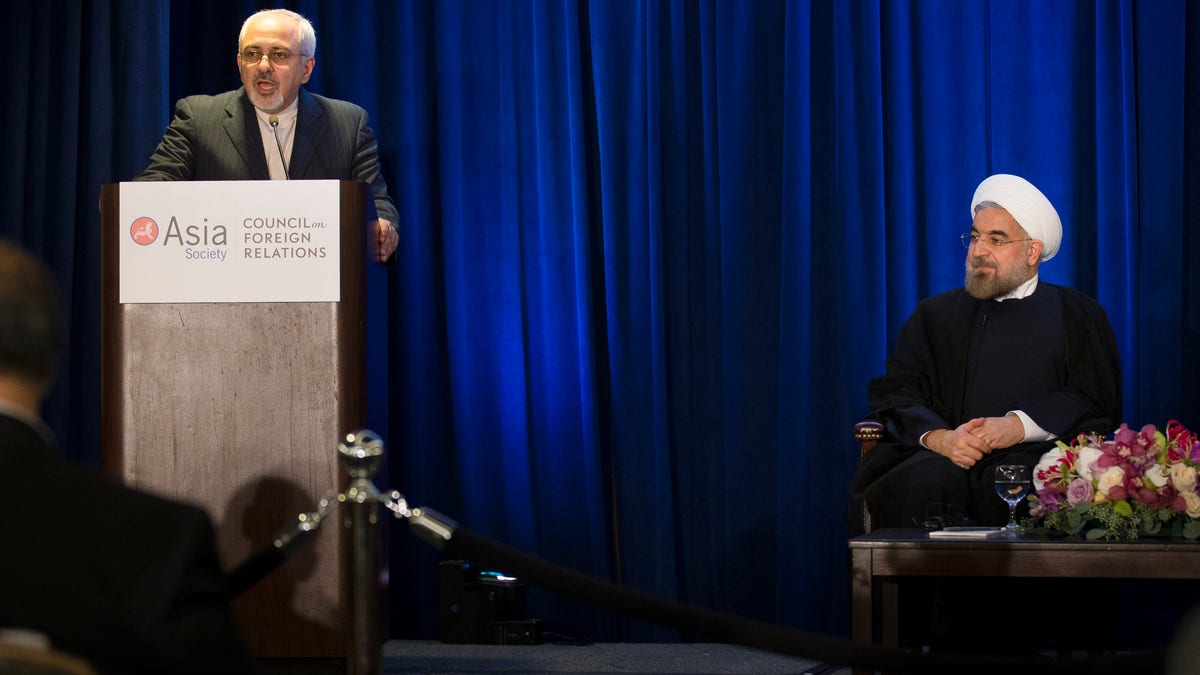
FILE - In this Thursday, Sept. 26, 2013, file photo, Iranian President Hassan Rouhani, right, listens as Iranian Foreign Minister Mohammad Javad Zarif, left, updates the audience on the results of his bilateral meeting with U.S. Secretary of State John Kerry, during a address and discussion hosted by the Asia Society and the Council on Foreign Relations at the Hilton Hotel in New York. Iran has suddenly gone public with a significant concession just days ahead of a new round of talks with six world powers that begin Wednesday, Nov. 20, 2013 in Geneva. It still insists that it has a right to enrich uranium, but it now says that the six no longer need to publicly acknowledge its claim, opening a way to sidestep the dispute and focus on more practical steps both sides can agree on. (AP Photo/John Minchillo, File) (The Associated Press)
GENEVA – A new round of Iran nuclear talks began in fits and starts Wednesday, with the two sides ending a first session just minutes after it began amid warnings from Iran's supreme leader of "red lines" beyond which his country will not compromise.
A senior U.S. official said the brief general meeting was only a formality and that bilateral meetings would continue through the evening to work on a deal that would start a rollback of Tehran's nuclear program in exchange for limited sanctions relief.
Both sides have said a first-step agreement is possible over the next few days of meetings in Geneva. But there was also tough talk, reflecting tensions from nearly a decade of negotiations that have started to make headway only recently.
There are other pressures, too. President Barack Obama faces opposition to a deal from Israel, Saudi Arabia and critics in the U.S. Congress, who say a first-step deal as envisioned would give Iran too much sanctions relief for too few concessions. They argue that Iran can't be trusted. Obama and his national security team counter that the risk is worth taking because the alternative is war no one wants.
While voicing support for the talks, Iran's supreme leader, Ayatollah Ali Khamenei, insisted there are limits to the concessions Tehran will make. He blasted Israel as being "the rabid dog" of the region -- comments rejected by French President Francois Hollande as "unacceptable."
French spokeswoman Najat Vallaud-Belkacem told reporters in Paris that such statements complicate the talks ahead, but France still hopes for a deal and its position has not changed at the talks.
Benjamin Netanyahu, in remarks after the meeting in Moscow with Russian President Vladimir Putin, said "we believe it is possible to reach a better agreement, but it requires us to be consistent and persistent."
At the previous round earlier this month, France said it wanted tough conditions in any preliminary deal with Iran. Negotiations then ended with both sides speaking of progress but continued differences on a final agreement.
Khamenei gave no further details in a speech to a paramilitary group aimed at both placating hardliners and showing his backing for Iranian officials preparing to meet with international negotiators. But his mention of Iran's "nuclear rights" was widely interpreted as a reference to uranium enrichment.
Western diplomats hope to reach an accord that would halt Iran's nuclear efforts while negotiators pursue a more comprehensive agreement that would ensure Tehran's program is solely for civilian purposes. Iran would get some sanctions relief under such a first-step deal, without any easing of the most harsh measures -- those crippling its ability to sell oil, its main revenue maker.
Iran has suggested it could curb its highest-known level of enrichment -- at 20 percent -- in a possible deal.
But Iranian leaders have made clear that their country will not consider giving up its ability to make nuclear fuel, the centerpiece of the talks since the same process used to make reactor stock can be used to make weapons-grade material.
Details of sanctions relief being discussed have not been revealed. But a member of Congress and legislative aides on Wednesday put the figure at $6 billion to $10 billion, based on what they said were estimates from the U.S. administration.
The aides and the member of Congress demanded anonymity because they weren't authorized to divulge the estimate publicly
Khamenei said he would not "interfere in the details of the talks," in a clear nod of support for the government of Iranian President Hassan Rouhani, which has opened historic exchanges with the U.S. However, Khamenei also said the main goal is "stabilization of the rights of the Iranian nation, including nuclear rights."
"There are red lines. There are limits. These limits must be observed," the supreme leader said. "We have told the authorities, and they are required to observe the limits and should not fear the bluster of the enemies and opponents."
Khamenei also blasted what he called the U.S. government's "warmongering" policies, including threats of military action. At the same time, Khamenei said that his country has "no animosity"` toward the American people and seeks "friendly" relations.
"Instead of using threats, go and repair your devastated economy so that your government is not shut down for 15 or 16 days," he said in a reference to the recent U.S. government closure amid a congressional budget standoff. "Go and pay your debts."







































